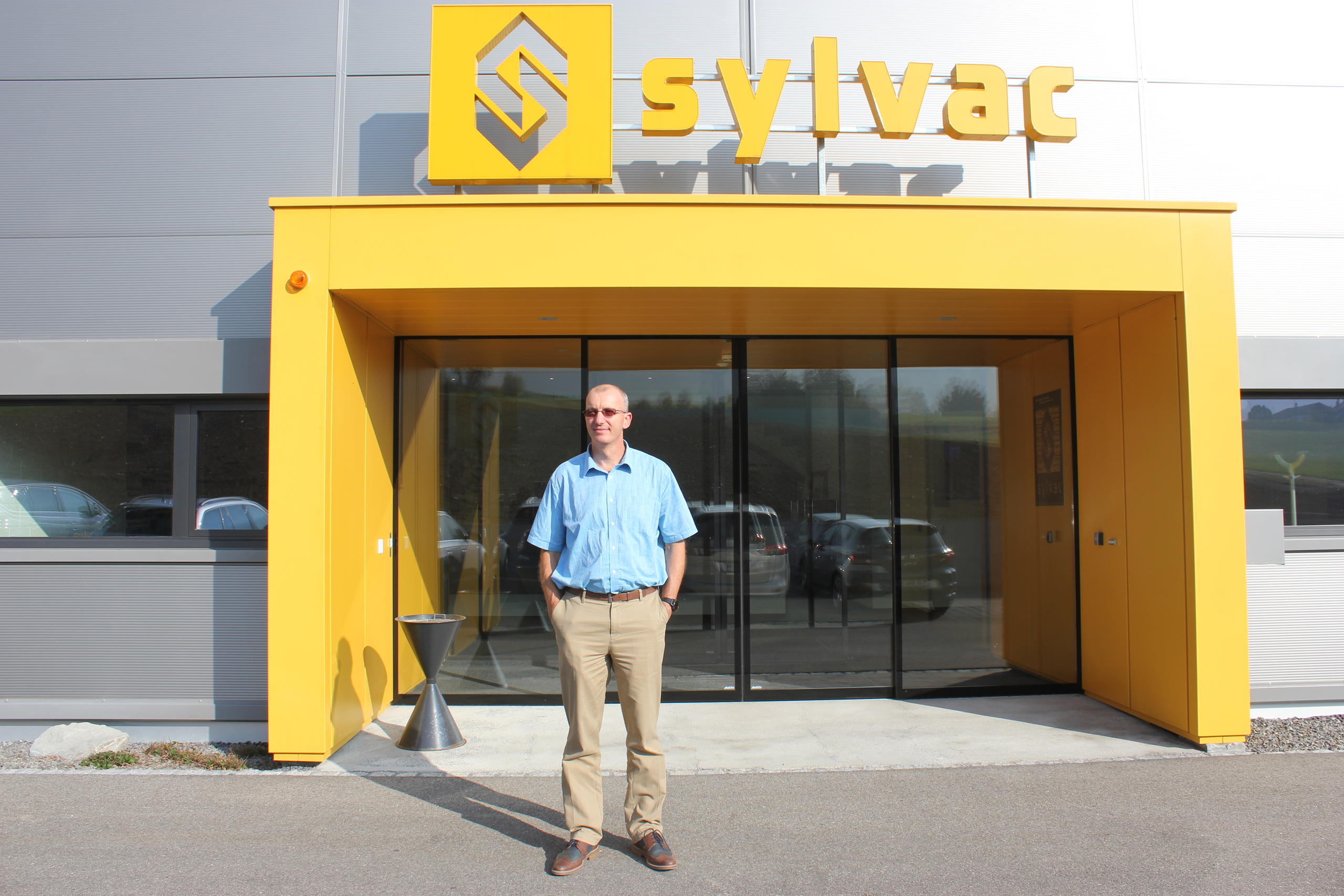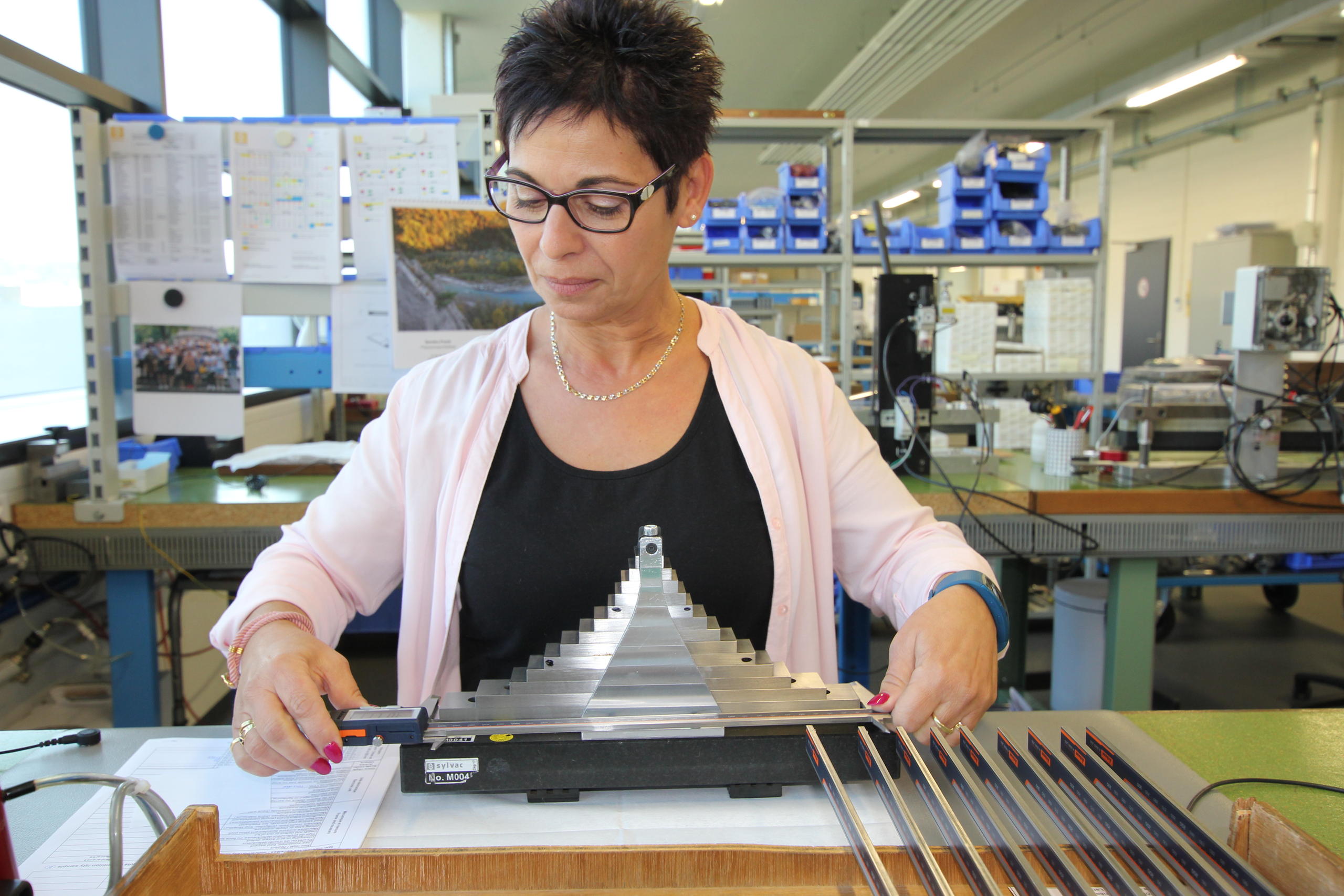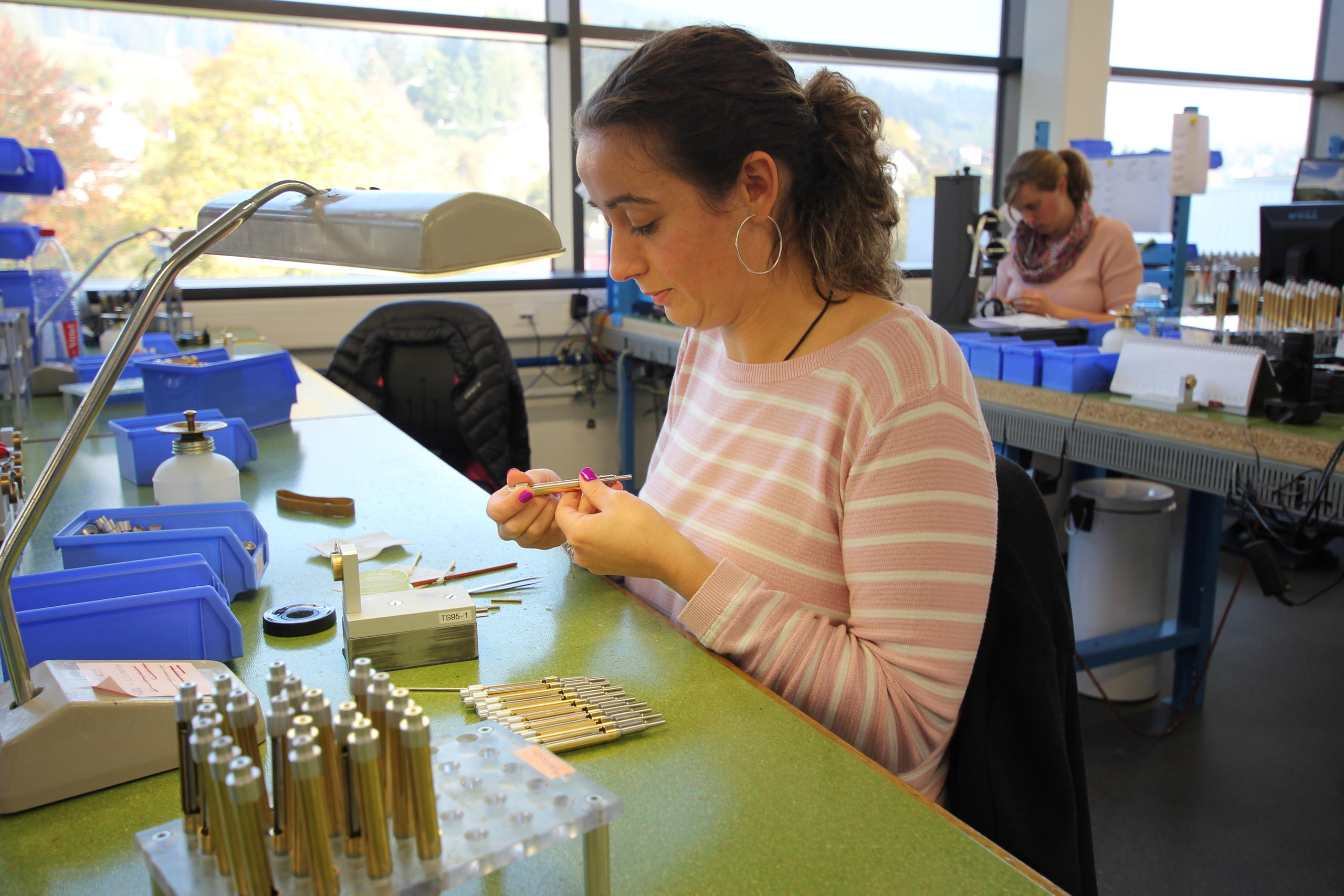
Meet a company at the heart of Swiss-made high precision

Swiss industry owes much of its success to the thousands of small and medium-sized enterprises (SMEs) that export extreme precision parts, tools and machines around the world. This is the story of one of them.
SylvacExternal link is a world-renowned specialist in the production of digital measuring instruments. Eric Schnyder is head of the family-run business that will celebrate its 50th anniversary next year.
Schnyder is satisfied with the way business is going, and with good reason. Sitting opposite the large bay windows in the ultra-modern factory, which opened in Malleray-Bévilard in the canton of Bern in 2014, the CEO of Sylvac describes how his company has taken off in recent years.
“Our turnover has increased by nearly 30% since 2015, reaching almost CHF30 million ($30 million); whereas we actually aim for 2% annual growth over the long term,” he explains.
Sylvac exports more than 85% of its production, mainly to Germany, China and the United States. Although it occupies only 3 to 4% of the market in measuring instruments – the world leader, Japan᾿s Mitutoyo, accounts for nearly half – the Swiss SME is renowned worldwide for its double-jaw digital callipers, the largest of which features in the Guinness Book of World Records.
A skilful blend of mechanics, electronics and metrology, Sylvac᾿s products can be used to measure the size of a screw implanted in a human bone, the diameter of a wheel used to operate the mechanism of a watch, or the degree of deflection of an aeroplane᾿s wings.

More
Tools exported across the world
At Sylvac, the word “precision“ is not taken lightly. The tools that come out of the Malleray-Bévilard plant are capable of measuring up to one-100th of a micron – 7,000 times less than the diameter of a hair.
In Switzerland’s DNA
“In our region, precision is rooted deep in our genes and passed down from generation to generation,” says Schnyder. That know-how mixed with a Protestant work ethic makes the Bernese Jura – the minority French-speaking part of canton Bern – a centre for world-class microtechnology production.
Seriousness, respect, reliability, flexibility, responsiveness, listening skills and a sense of compromise are fundamental values at Sylvac, its CEO says.
“These are all qualities that enable us to stand up to international competition; especially today, when the service provided with the product is ever more important.”
The other side of the coin is a certain mistrust of everything that comes from the outside. “You cannot be focused on tiny parts all day and at the same time be very open-minded,” admits Schnyder.
Following two bad experiences, the company management decided to stop taking on French cross-border workers.
“The cultural differences are too great. Here, people are rather taciturn and donʼt like it if others talk too much or donʼt keep their word,” he explains.
Pride and gratitude
Many of the employees, especially the operators in the assembly workshop, have surnames of Italian, Portuguese or Spanish origin. But they have all been living in the valley for a long time and are thoroughly familiar with the local habits and customs.
“We are very proud to work for a company that exports products stamped with ῾Swiss made᾿ around the world. The working conditions are excellent and the management is very understanding,” says Silvia *, a 30-year-old from Portugal, who says she feels fully integrated within the company.

At Sylvac, the minimum wage is CHF3,800 ($3,788) a month, as laid down by the collective labour agreement for the sector. The company employs 130 people in Switzerland, at its sites in Malleray-Bévilard and Crissier in the canton of Vaud, as well as some 40 sales employees in China, Thailand and India.
Innovation at the core
Held entirely by three shareholder families, Sylvac does not aim for high- profitability targets. This means it can allocate between 10 and 12% of its turnover to research and developing new products. “Thatʼs a lot for a company our size,” Schnyder points out.
The CEO places great hope in the ongoing digital transformation, often described as the fourth industrial revolution. Artificial intelligence and new image processing techniques will make it possible to eliminate many repetitive and administrative tasks in the future, he believes.
“It will still take years, but I see a real chance here for Swiss industry, which today has to contend with high production costs. As production becomes increasingly automated, whole sectors of industrial activity could be relocated to Switzerland, where we have an extremely favourable ecosystem,” he says.
Is a new crisis looming?
Despite the robust health of Swiss industry and encouraging prospects, the management of Sylvac remains down-to-earth. Economic ups and downs are an integral part of the life of the company, and the crisis of 2009 – when turnover fell by 52% – remains deeply ingrained in everyone᾿s memory.
“Over the past ten years, except for the difficulties arising from the strong Swiss franc, we have not experienced a major economic downturn. The economy is clearly overheating and a slowdown is expected in the coming months. But whatever the scale of the next crisis, we are much better prepared to deal with it than we were ten years ago,” says Schnyder.
*not her real name
Switzerland, a land of high precision
The Swiss precision industry includes the mechanical, electrical and metal (MEM) industries, as well as watchmaking. The 15,000 companies active in this field, mainly SMEs, employ more than 400,000 people in Switzerland.
Accounting for nearly 9% of the Swiss gross domestic product, in 2017 the industry generated over CHF86 billion in exports.
Many companies have specialized in the manufacture of high-precision measuring instruments. These include Tesa and Rüeger in Vaud, Endress + Hauser Flowtec in Basel and Zumbach in Zurich.
(Translated from French by Julia Bassam)

In compliance with the JTI standards
More: SWI swissinfo.ch certified by the Journalism Trust Initiative
















![The four-metre-long painting "Sonntag der Bergbauern" [Sunday of the Mountain Farmers, 1923-24/26] had to be removed by a crane from the German Chancellery in Berlin for the exhibition in Bern.](https://www.swissinfo.ch/content/wp-content/uploads/sites/13/2025/12/01_Pressebild_KirchnerxKirchner.jpg?ver=855f1d9f)














You can find an overview of ongoing debates with our journalists here . Please join us!
If you want to start a conversation about a topic raised in this article or want to report factual errors, email us at english@swissinfo.ch.